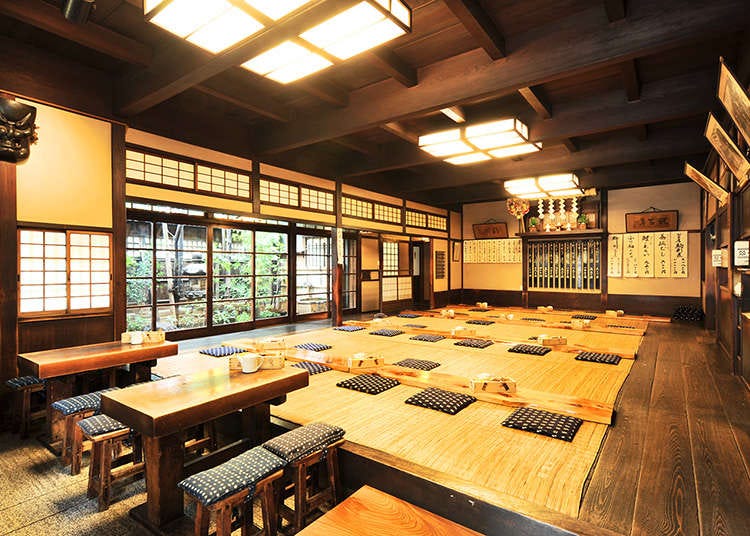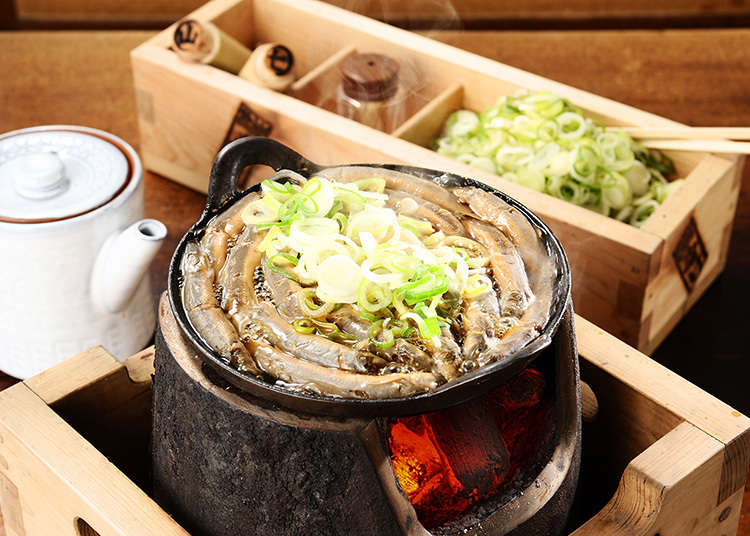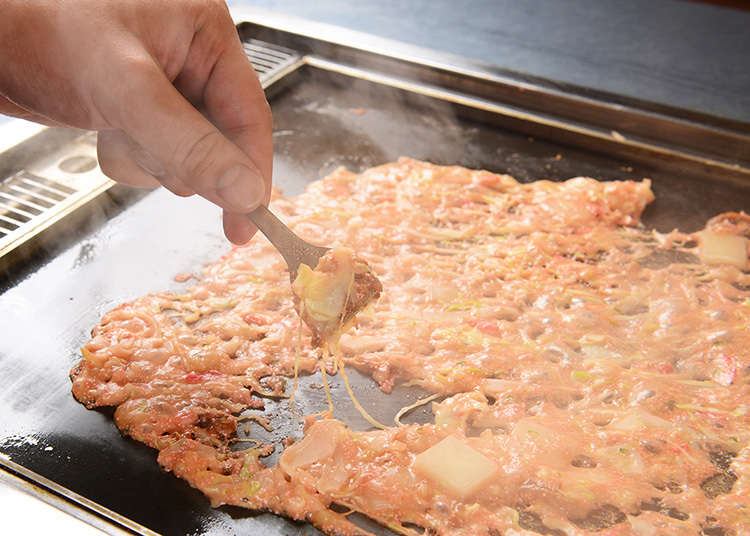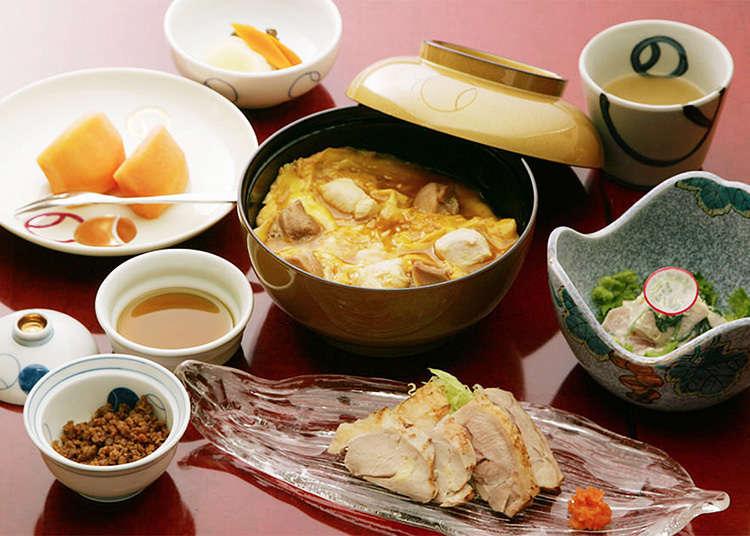
There are restaurants serving traditional Japanese dishes cooked using unique recipes with distinctly Japanese ingredients. Some of these dishes are still unfamiliar to foreign visitors. Why not try some traditional Japanese cuisine at a specialized restaurant and learn about Japan from a number of different angles?
Komakata Dozeu, a long-established loach restaurant in Asakusa

Loach was a popular food for common people during the Edo period. Originally, the restaurant was called Do-ji-ya-u, but the founder of this restaurant decided to change the name to Do-ze-u because he believed a four character name would bring bad luck (the number four is associated with death in Japan). Loach is a food rich in calcium, iron and collagen. The restaurant has served its popular loach dishes cooked to traditional recipes since the Edo period. The signature dish is Dozeu Nabe (1890 JPY), in which carefully selected loaches are put in sake until they become drunk and then cooked in sweet miso sauce and broth. You must check out the traditional Japanese style building too.
-
Komakata Dojo駒形どぜう
- Address 1-7-2, Komagata, Taito-ku, Tokyo, 111-0043, Japan
Hyotan, a popular monja (Japanese pan-fried batter) restaurant

Monjayaki (Monja) is a Tokyo specialty. Shredded cabbage and other ingredients are mixed with a flour and water batter and thinly cooked on hot iron plate. The restaurant serves its original flavor Monja, as well as various other varieties such as the tokusen-monja (special monja, 1674 JPY) which has a miso flavor. Various other dishes such as okonomiyaki savory pancake, fried soba noodles, and fried udon are also available. It is conveniently located nearby the Nakamise-dori shopping street leading to Senso-ji Temple and is always crowded with many customers.
-
Edo-monja Hyotan江戸もんじゃ ひょうたん
- Address 1-37-4, Asakusa, Taito-ku, Tokyo, 111-0032, Japan
Tamahide, a popular Shamo chicken restaurant

This Shamo chicken restaurant was founded in 1760 by Tetsuemon Yamada, who was serving as a hawker for the Edo Shogunate. They use Tokyo Shamo chicken, a new breed of the Shamo chicken that was first brought to Japan in the early Edo period. Shamo Nabe (price from 16,200 JPY), in which Shamo chicken is cooked in a strongly flavored sauce, is said to have been the inspiration for sukiyaki hot pot. The restaurant is also famous for being the first restaurant to serve oyako-don (1500 JPY), a bowl of rice with Shamo chicken omelet cooked with the sauce. People always queue up for the oyako-don in the restaurant in Nihonbashi. At this famous restaurant, you can thoroughly savor the traditional chicken dishes which have been served since the Edo period.
-
Tamahide鳥料理 玉ひで
- Address 1-17-10, Nihonbashi-Ningyochou, Chuo-ku, Tokyo, 103-0013, Japan
- Area
- Category
*Prices and options mentioned are subject to change.
*Unless stated otherwise, all prices include tax.
Recommended places for you
-

GINZABANSUKESHINJUKUTAKASHIMAYATAIMUZUSUKUEA
Other Japanese Food
Shinjuku
-

wagyuutokome Nakatake
Other Japanese Food
Ginza
-

TOKYO SKYTREE®
Landmarks
Ryogoku / TOKYO SKYTREE(R)
-

Wasui Yaesuten
Other Japanese Food
Tokyo Station
-

Koube Beef Kappo OMOKI Shinnihonbashi
Other Japanese Food
Tokyo Station
-

MomotaroUeno
Other Japanese Food
Ueno
-

Step Into the World of Chiikawa: Immersive 'Chiikawa Park' to Open in Ikebukuro's Sunshine City This July!
-

23 Quirky and Fun Things to Do in Akihabara
by: Himanshi Shah
-

Via Inn Prime Osaka Kyobashi Mizukinoyu: A Convenient Hotel Near Osaka Castle with Open-Air Baths and Nearby Sightseeing
by: Yotsuka Hizuki
-

A Don Quijote Like No Other: Step Inside the All-New Tourist-Friendly Store at Shinjuku Tonanguchi Bekkan (Open June 13)
by: Chehui Peh
-
Ad

Lapoppo Farm, one of Japan's leading makers of sweet potato treats! An in-depth guide to the secrets behind its popularity, including best-selling products and facilities!
-
Ad

Tokyo Comedy Bar: Where Jokes and Craft Beer Flow Freely
Inspiration for Accommodations
-

Enjoy Mt. Fuji from the Comfort of Your Room! Recommended Ryokan with Mt. Fuji View
-

Stay Near the Cherry Blossoms! Hotels for Cherry Blossom Viewing in Tokyo
-

Family-Friendly Hotels with Free Shuttle to Disneyland: Convenient Access for a Magical Stay
-

Top Ranked Hakone Hotels with Mt. Fuji View: Enjoy Stunning Scenery from Your Private Space
-

Convenient Tokyo Hotels with Airport Shuttle: Ideal for Families and Heavy Luggage
-

Stunning Tokyo Tower View Hotels: Enjoy Spectacular Scenery from Your Private Space
-

Convenient Asakusa Hotels with Kitchens: Ideal for Extended Family Visits
-

Experience Luxury: Hakone's 10 Best Five-Star Accommodations
-

Enjoy Mt. Fuji Autumn Leaves! Top Hotels Near the Popular Autumn Leaves Corridor
-

Experience Hakone Fall Foliage from Your Room with Stunning Views
-

Shibuya Crossing: Getting the Best View from the Deck at Magnet by Shibuya109!
-

A Guide to Japanese Donburi: We Asked an Expert About the Basics and How to Enjoy this Traditional Dish!
by: Miyu Shimada
-

Italian Restaurants in Tokyo
-

Essential Tokyo: The Complete Guide to Ikebukuro Station
-

Simply Delicious! 3 Must-Try Home-Cooked Japanese Dishes
-

JR Edition: Visit all of Tokyo in one Day with the Tokyo Metropolitan District Pass!
- #best ramen tokyo
- #what to buy in ameyoko
- #what to bring to japan
- #new years in tokyo
- #best izakaya shinjuku
- #things to do tokyo
- #japanese nail trends
- #what to do in odaiba
- #onsen tattoo friendly tokyo
- #daiso
- #best sushi ginza
- #japanese convenience store snacks
- #best yakiniku shibuya
- #japanese fashion culture
- #best japanese soft drinks













